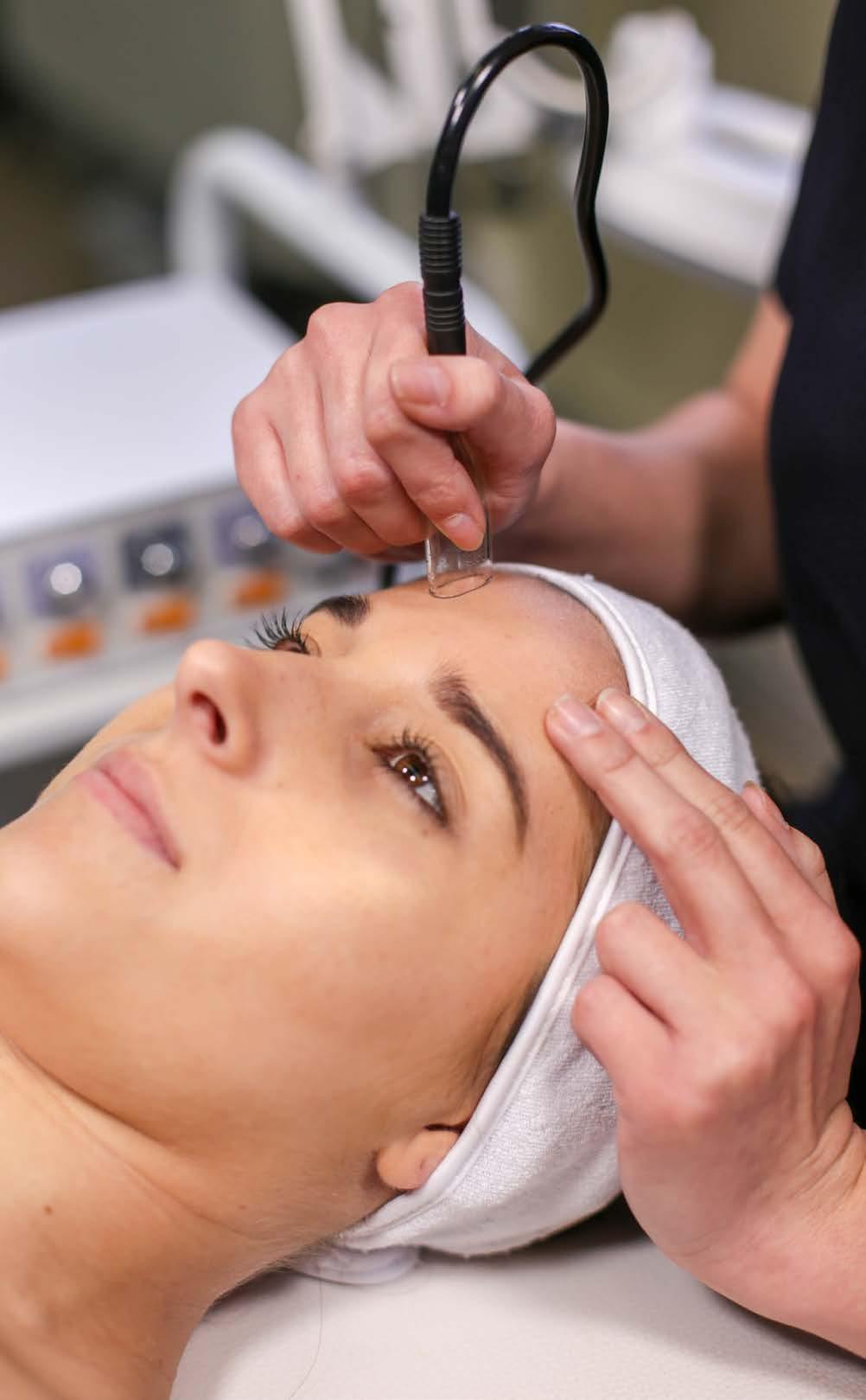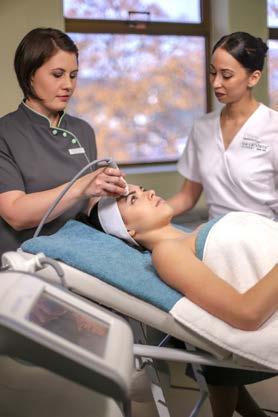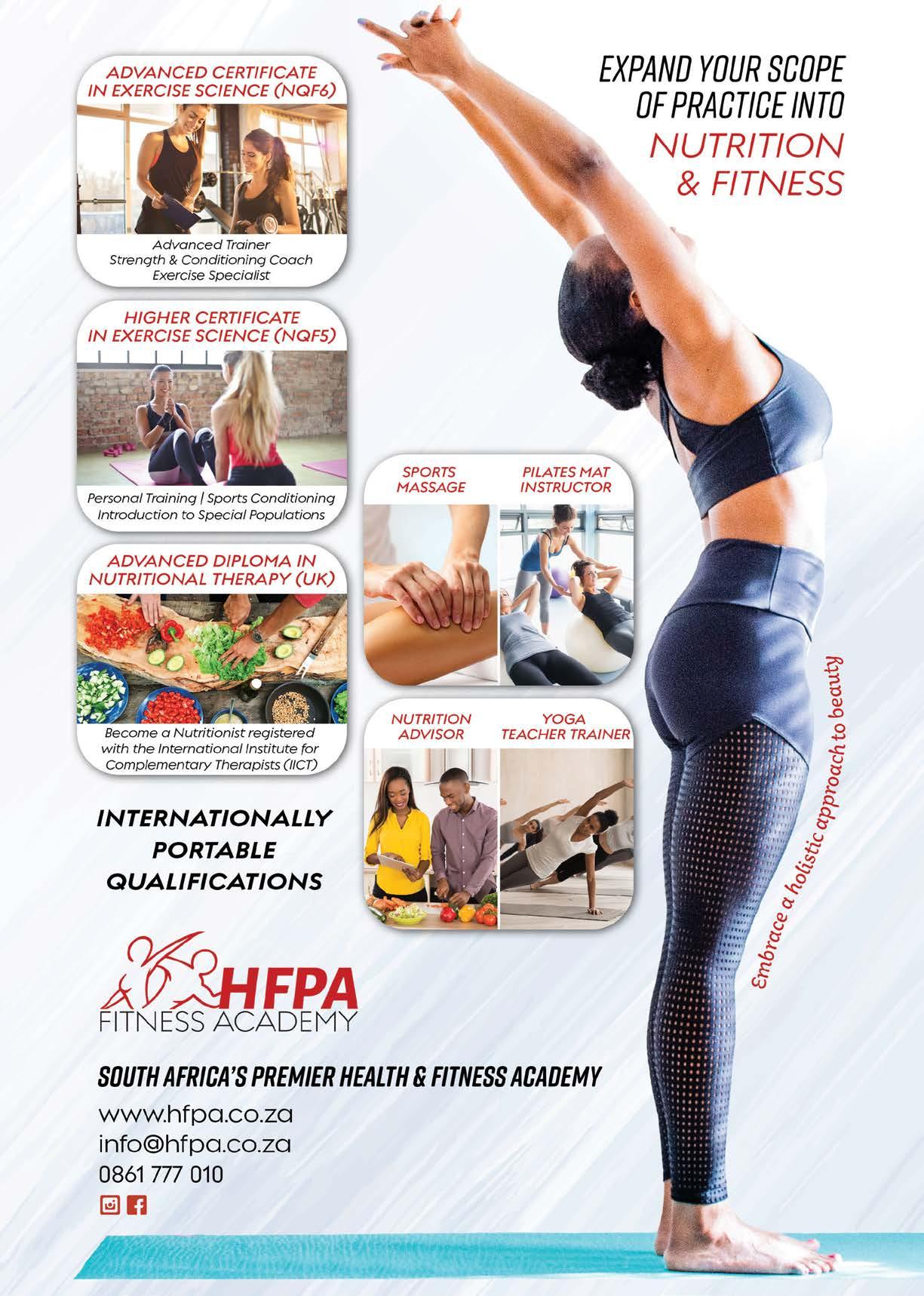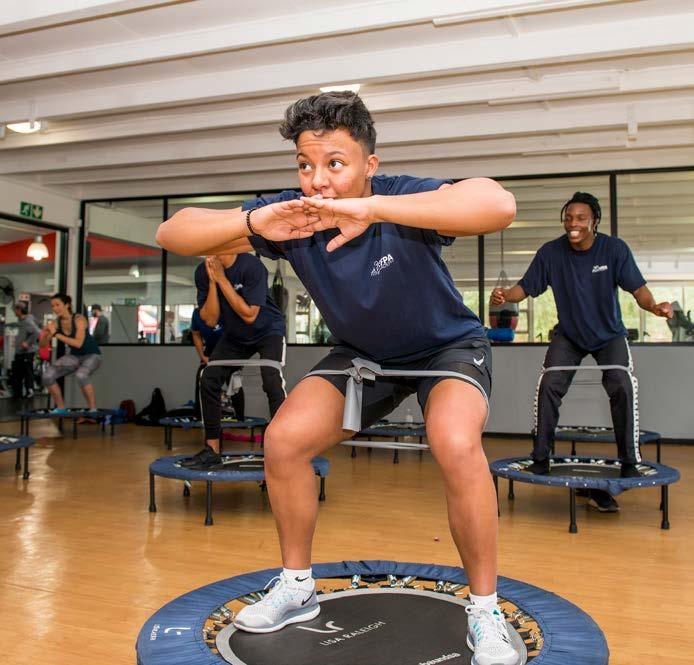
9 minute read
Close study
A close study
With the future of the beauty industry in the hands of the next generation of therapists, JOANNA STERKOWICZ speaks to some top training institutions to find out what challenges they face and how they have dealt with the COVID-19 pandemic and lockdown. hile the COVID-19 lockdown in South Africa has had a catastrophic W effect on the economy, it also totally disrupted tertiary education study schedules. Says Yolandé Swanepoel, academic head of Isa Carstens Academy: “We had to adapt our teaching methodology to include online training for our theory components. This enabled us to restructure our academic programme to focus on the theory components during the lockdown period and we are in the process of phasing in our students in line with the legislation laid down by the Department of Higher Education and Training. “With the focus on the practical components when students return, we will be able to successfully teach out all final year students to still graduate, and for our 2nd and 3rd year students to progress to the next academic year.” As soon as President Cyril Ramaphosa announced the lockdown on 27 March, director of Soma Sense Academy, Menna Kleine, and her team prepared a revised timetable mainly focusing on the theoretical aspects of the programmes. She continues: “As most students did not own a laptop but owned smart phones, my ingenious team worked out that if the students bought a WhatsApp ticket for as little as R26, we could use this platform to send messages and lecturers could make small videos of the practical
Advertisement

aspects of the syllabus. They can also hold small video WhatsApp group training calls.”
For beauty therapy practical lessons, students were required to perform the various treatments on a family member at home and had to submit videos of their work.
Comments Kleine: “The key area where our students missed out was the physical and tactile aspects of the syllabus, where the student can feel the massage movements and techniques performed on themselves, and the guidance they receive while performing this on a model.
“I found the communication between all the educational entities very poor to say the least, and the frustration of waiting for months to get some clarity on our future was torturous. Almost a month was wasted waiting for the government to publish the regulations.”
As BTI (Beauty Therapy Institute) launched online theory learning in March 2019 to accommodate the 21st century learner, the school was already e-ready when lockdown happened.
Says BTI director, Sandy Fuhr: “We also continued with theory classes via webinars and WhatsApp calls, utilising our App
and learning platform for our students. Additionally, we used lockdown time to create more videos, online assessments and PowerPoint presentations to help our students learn in an easier manner. Now that the theory is behind them, we are focusing on practicals, which of course is the fun part.”
Obstacles
As to the biggest challenges facing the beauty tertiary education sector, Isa Carstens Academy’s Swanepoel believes the magnitude of different levels of courses in the industry is a huge hurdle.
States Swanepoel: “The general public and employers (and in many instances also prospective students and therapists) are unaware of the differences between these qualifications. This often leads to students not being able to get their dream job with the qualification/ course they completed, and qualifications not being recognised for credits should students want to pursue further career paths. Employers end up disappointed in the therapists they employ.
“Students who have completed courses at unregistered tertiary >



institutions were brought under the impression that their qualifications are on an equal level as those of registered schools, only to find out that the piece of paper they received is not recognised at all in the formal South African education framework.”
Soma Sense’s Kleine believes that funding of students is a huge challenge. “Many of the students who have a love and passion for our industry don’t always have access to funding In this regard, private providers are not receiving the funding opportunities they used to receive in the past. Unfortunately, the funding that is available through the Services Seta (Sector Education & Training Authority) is allocated to learnerships and not bursaries.
“This makes a huge difference as a bursary covers all the costs for the students’ studies, whereas learnerships do not provide enough funding for a student to receive the requisite kits/ tools etc. to complete the qualification in a meaningful manor. Furthermore, the funding is often only designated for employed learners only, or it is only allocated to public providers that are already subsidised. So, our industry is spending a lot of money on skills development levies but is not seeing a quality added return.”
BTI’s Fuhr believes that online practical learning and teaching that is being done in unscrupulous schools is adversely affecting the sector. She continues: “I think there is still a fair portion of flyby-night, unregistered beauty schools around. In fact, I just heard of one such place that taught a student waxing and nails online in five days! What a concern for the unsuspecting consumer, which leads to potentially giving the industry a bad reputation.
Work ethic
A common complaint from beauty salon and spa owners and managers, is that graduates often don’t exhibit the kind of work ethic needed in the professional environment.
Says Isa Carstens Academy’s Swanepoel: “Over the past 42 years, we have found that discipline and fostering a passion for this industry are key factors to establishing a solid work ethic in our students. We are thus very strict on dress code, conduct and professionalism at all times. During our training, we focus on teaching students to believe in their own capabilities and the impact they have on their client’s well-being, creating a sense of belonging as part of the Isa Carstens family and then they soon start to behave in a manner of which we are proud. To give students experience of a realworld working environment, we have two Wellness Clinics that are open to the public on a daily basis.
“It comes down to understanding what attributes you want in a therapist for the specific position and understanding the different levels of qualifications in South Africa. Attributes go much further than just looking at the skills the therapist can perform, and I often think this is where the confusion comes in.”
Soma Sense’s Kleine adds: “While we do our best at the academy to engender a solid work ethic in students, I strongly believe that the salons/ spas that will succeed will be those that focus their energies on building a new team dynamic, where everyone has to have a more profound understanding of the importance of service delivery, client care and gratitude for the clients who do visit our salons and spas. >

“This requires a thorough understanding of what our clients’ needs are, which means we have to go back to basics and embrace the good old client card. In many cases I have found that therapists do not even read their client cards and cannot understand why they can’t make a sale. We need to let our teams know that we need to fulfill our clients’ needs. The team also needs to have a clear understanding that the business is only as good as their weakest link or therapist.”
Qualifications
Isa Carstens Academy’s Swanepoel advises salon owners and managers who are looking for therapists to first ensure that the candidate’s qualification was obtained from a registered provider. All providers, private and public, need to be registered by the Department of Higher Education and Training.
She continues: “Then you need to look at the NQF level of the specific qualification. The Government introduced a single unified national qualification framework for education in South Africa that applies to all public

and private institutions in South Africa. This allows for students to easily move from one qualification to another, as well as between institutions.
Information is available at https://allqs.saqa.org.za/
“It is important to note that a Higher Certificate and Advanced Certificate will not give you automatic access to an Advanced Diploma. Should you want to progress academically, the best route would be to start with a Diploma in Somatology. Short courses are not listed on the National Qualifications Framework; they are not credit bearing and do not lead to a qualification.”
Holistic knowledge
A beauty professional who has knowledge of the inner workings of the body, as well as knowledge of the positive effect that nutrition, health and fitness can have on a client’s skin and hair, is undoubtedly going to be ahead of the curve, and their peers.
So says Paul Mills, MD of HFPA Fitness Academy. He continues: “Upskilling yourself in these areas can only add value to your offerings, and therefore, to your clients. There is a misconception that, if you study nutrition and fitness, you will either work as a fitness professional, or a nutritionist. What if you could use all of these qualifications together, and work as a health and beauty coach for your clients, with the ability to grow your scope of practice far beyond what you thought possible?
“COVID-19 has seen many health and beauty professionals becoming a lot more creative in order to stay relevant and to make money. Your boundaries are only limited by your imagination. If you are passionate about health and beauty, there is no limit to what you can achieve, as long as you have the correct qualifications.”
Mills notes that HFPA has an extensive offering of internationally portable courses to suit the need of anyone looking to upskill themselves and branch out. One of the most advanced fitness courses is the Higher Certificate in Exercise Science. This is a higher education qualification that offers Personal Training, Sports Conditioning and an introduction to Special Populations. The Advanced Certificate in Exercise Science (NQF6) leads on from this course, allowing the graduate to work with special populations such as the young, the elderly and pregnant women. It is available in Full Time, Part Time and Distance modes, making it accessible to the working beauty professional anytime, anywhere. Internationally, Higher Education qualifications are recognised as being of a very high standard.
HFPA also offers the Plaskett Advanced Diploma in Nutritional Therapy course. States Mills: “This is an incredibly scientific and advanced practitioner level course that qualifies you to be a nutritionist. Students can register with the International Institute for Complementary Therapists (IICT),
“If you prefer to start on a smaller scale, why not look at some of our shorter courses such as sports massage, nutrition advisor, pilates mat instructor or yoga teacher trainer.” PB










